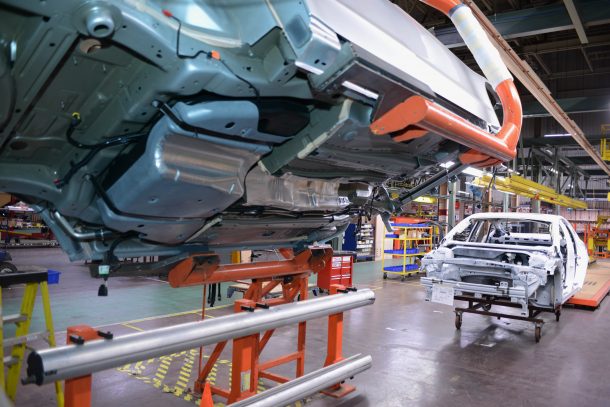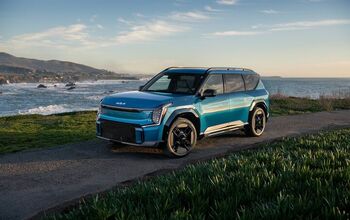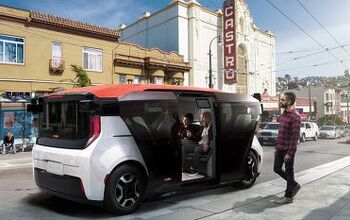Michigan to Mexico: Ford's Upcoming Electric Crossover Moves House

In public, automakers talk a great game about the industry’s electric future. The money poured into the development of electric vehicles is necessary, they say, in order to stay competitive in a changing marketplace. It wasn’t long ago that Ford claimed 100 miles of range was just fine for an EV model; not long after, following the introduction of the 238-mile Chevrolet Bolt, it announced the development of an EV crossover with far greater (300-mile) range.
Whether or not electric power becomes the dominant propulsion source in the United States remains to be seen, but no automaker can be seen resting on its laurels, shunning the most hyped technology. That doesn’t mean a company can’t be realistic about it, though.
Ford’s electric crossover, expected to roll out of Michigan’s Flat Rock assembly plant in 2020, will instead roll out out of a factory in a much warmer (and cheaper) locale.
News of the production change comes by way of a company memo obtained by Automotive News. Ford’s EV crossover — the byproduct of a $700 million investment into the Flack Rock plant — will be built in Cuautitlan, Mexico. Ford Motor Company has confirmed this report.
“This allows us to bring this exciting new vehicle to global customers in a more effective way to support our overreaching business goals,” the memo stated.
There’s no one alive today who believes a Mexican production line is more expensive to operate than an American one. Ford’s beancounters clearly felt the model’s production costs, coupled with uncertainty over its popularity with EV-hesitant U.S. consumers (and the need for an affordable sticker price), necessitated a trip south of the border. It’s a trip recently made by another Flat Rock alumnus, the Ford Fusion.
Calling the model “affordable” and “mainstream” earlier this year, Ford chief technology officer Raj Nair said, “We think we have a technology path that will get us a 300 plus miles range and an affordable crossover utility that will be fully competitive.”
The biggest concern surrounding EVs these days, besides the potential for battery-based mineral shortages, is how automakers can make a profit from vehicles that are much more expensive to produce than regular cars. General Motors claims it has a plan. Now, Ford seems to have one of its own.
The Blue Oval is downplaying the crossover’s move, preferring to highlight changes to the plant itself. Ford has announced another $150 million for Flat Rock — and another 150 jobs — in the interest of bulking up its development of autonomous vehicles and freeing up production space. The company now plans production of a commercial-grade self-driving vehicle powered by a hybrid drivetrain. The model will carry a new nameplate, the company says.
“We see a bigger opportunity now than we originally saw,” Ford spokesman Allan Hall told Automotive News.
The as-of-yet-unnamed autonomous model is expected to appear in 2021.
[Image: Ford Motor Company]

More by Steph Willems
Latest Car Reviews
Read moreLatest Product Reviews
Read moreRecent Comments
- Formula m For the gas versions I like the Honda CRV. Haven’t driven the hybrids yet.
- SCE to AUX All that lift makes for an easy rollover of your $70k truck.
- SCE to AUX My son cross-shopped the RAV4 and Model Y, then bought the Y. To their surprise, they hated the RAV4.
- SCE to AUX I'm already driving the cheap EV (19 Ioniq EV).$30k MSRP in late 2018, $23k after subsidy at lease (no tax hassle)$549/year insurance$40 in electricity to drive 1000 miles/month66k miles, no range lossAffordable 16" tiresVirtually no maintenance expensesHyundai (for example) has dramatically cut prices on their EVs, so you can get a 361-mile Ioniq 6 in the high 30s right now.But ask me if I'd go to the Subaru brand if one was affordable, and the answer is no.
- David Murilee Martin, These Toyota Vans were absolute garbage. As the labor even basic service cost 400% as much as servicing a VW Vanagon or American minivan. A skilled Toyota tech would take about 2.5 hours just to change the air cleaner. Also they also broke often, as they overheated and warped the engine and boiled the automatic transmission...


































Comments
Join the conversation
This is what happen if you screw with trading partners that can bypass you. Mexico and China can trade EV with each other so US don't have to do anything with it. I'd not be surprised Mexico and China do this even if it is not cheaper than trading with the US, just as a big FU to DTJR.
Are there still consumer incentives to buy EV's? If so, and since these are really just transfers of funds to the manufacturers, does it make sense to collect taxes to give to companies for product they manufacture in another country? We won't be able to tax the mexican workers to collect some of this back?